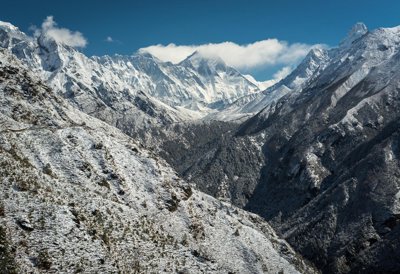How did you get to where you are now?
I studied A Level biology, chemistry, maths and geography (with an A/S level in French). During my studies, I enjoyed learning about the natural environment, and developed a strong interest in understanding the impact of past and future climate change(s). This led me to enrol in an integrated Masters in Geography (MSci) at Durham University. My module choices allowed me to focus on glaciology, reconstructing past environments and oceanography. Having the additional year as an undergraduate, to gain the masters qualification, meant I had the opportunity to specialise in a chosen independent research topic, whilst expanding my knowledge and skills in other areas of geography through taught modules and coursework.
After graduating, I began working in the Communications Team at British Antarctic Survey (BAS) as the Digital Communications and Engagement Officer. Whilst in this post I gained valuable press office and science communications experience. This led me to be put forward for a promotion to my current position at British Antarctic Survey.
Was there anything particularly useful that helped you get into this role?
During my third year at university, the Senior Science Communications Manager at British Antarctic Survey gave a talk, in which I asked her how I could gain experience required to find a role in science communication. Following this, I was offered the opportunity to undertake an eight week summer work experience placement in the Communications Team at British Antarctic Survey. My primary task was to evaluate the organisations social media channels and make recommendations for the future. This gave me an insight into roles within the sphere of science communication, and provided me with science communication and press office experience. During this placement I made connections with the team and this enabled me to contact them for advice when looking for jobs during my final year of university.
What do you do as part of your role?
In this role my main responsibilities include:
-
Event delivery to mark major construction milestones in the project
-
Write and update copy about the new polar ship, for online, media and public engagement
-
Digital communications about the new polar research vessel for Britain via social media and e-newsletters for stakeholders
-
Co-ordinate British Antarctic Survey's contribution to the cross-government 'Year of Engineering' campaign
-
Support public engagement campaigns for the RRS Sir David Attenborough across the UK
This job is very varied and regular tasks include:
-
Writing news stories, press releases and web content about BAS science and operations. For example, promoting results from recently published research papers, fieldwork activities and major project progress
-
Managing social media content for official BAS channels
-
Identifying public and stakeholder engagement opportunities and planning then co-ordinating these events
-
Setting up interviews with journalists and broadcasters and briefing staff for interviews/media comments
-
Monitoring and evaluating team outputs – seeing how our campaigns and news stories are performing and reporting results upwards to senior staff
What skills and characteristics do you need for this role, apart from geographical knowledge?
-
Strong written and verbal communication – converting complex scientific concepts and results into plain language for non-specialist audiences
-
Creativity – thinking of how to generate engaging web and social media content from the photographs and video footage we receive
-
Data analysis – recording the impact of team outputs i.e. how much media coverage a press release achieved or how many engagements the BAS social media posts achieve each month
-
Team work
-
Balancing priorities and time management
How does geography feature in your work/what difference does it make?
Although I don’t work within research/academia, my job is a great way to stay in touch with geography and climate science while developing different skills and sharing the results with a range of non-specialist audiences. I communicate the work of scientists, engineers and support staff who are helping to further our knowledge of the polar regions and so my geographical knowledge is useful for translating research papers into plain language.
What advice would you give to someone wanting to go in to this career?
Take the opportunity to read how science stories are reported in different outlets. Practice writing scientific research in plain language and make sure you have examples that you can bring with you to an interview. Make the most of any opportunity to be involved in communicating science, for example, volunteer at events explaining science to the public or take part in schools talks (e.g. the RGS-IBG Geography Ambassadors programme).
Why did you choose geography? Why should others choose geography?
I chose geography because of my interest in environmental science and climate change. It gave me the opportunity to pursue my academic passion and explore environments through fieldwork. Geography teaches valuable transferable skills required for a huge range of roles, such as team work, presentation skills, project planning and management and it encompasses a broad range of topics so you can specialise in many different areas, it’s a very flexible subject. You gain a more holistic view of global issues, compared to some more traditional subjects.
Jobs in this role can attract salaries of between £26,000 - £31,999.
Layla Batchellier
Job title: Communications and Engagement Manager
Organisation: British Antarctic Survey
Location: Cambridge, UK

